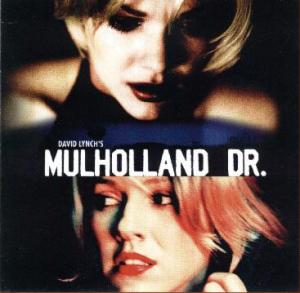Angelo BADALAMENTI
Mulholland Drive
Music from the film
MILAN 74321 89823 2 [74:04]

Anyone whoís ever had trouble with David Lynchís movies, or indeed the resultant concept albums, is going to have trouble with this one. In the same vein as Wild At Heart, Twin Peaks: Fire Walk With Me and Lost Highway, this is a jumble of musical ideas mixed in what often seems like sound effect. That said, anyone familiar with those others already knows the trick to get the best out of this new album. Just re-programme the play order.
Most likely to be deleted will be Angelo Badalamentiís "Rita Walks / Sunset Boulevard / Aunt Ruth" with its uncomfortable rumbling from percussion and "Diner" with its uncomfortable string effects and alternate industrial machinery noise. Unfortunately in the 12 minute "Dwarfland / Love Theme" you wonít be able to separate the early drone which gives way to a beautiful romantic melody (although at times dangerously close to some of Hans Zimmerís Thin Red Line). Yet even ignoring these cues leaves plenty of worthies. And thatís the point.
Other cues by Badalamenti to stay include the title track, which will most put you in mind of his Twin Peaks TV theme, but without the grace or optimism. "Diane and Camilla" features gorgeous string writing, "Silencio" has a blend of synth and sax forming an intriguing yet discomforting melody and headlining the album is the all-too short yet finger-snapping "Jitterbug".
As always there are some choice source cues of songs that clearly appeal to Lynchís skewed (often Fifties-based sensibilities). "Bring It On Home" by Willie Dixon has Milt Buckner warbling "bayyyyyyyyyyyybeh" in a very scratchy recording. Oscar Hammerstein and Jerome Kernís "Iíve Told Every Little Star" comes via the squeaky voice and cutesy pie of Linda Scott. "The Beast" is a slinky number with a cheesy but great synth part from Dave Cavanaugh. Most important of the source material though is Roy Orbisonís "Crying". Youíd be forgiven for thinking Lynch was attempting to repeat his trick from Blue Velvet (using "In Dreams"), until you hear this rendition, which is sung in Spanish ("Llorando") without accompaniment by Rebekha Del Rio. Itís not something youíll quickly forget.
Perhaps the real discovery on this album however is the extent of Lynchís hands-on involvement. Heís co-written with Badalamenti before, but here heís actually performing on cues alongside him. More important though are the 3 cues written with John Neff ("Pretty 50s", "Go Get Some" and "Mountains Falling") which are all highlights of the score for their own reasons.
So long as you know to take a Lynch / Badalamenti album as an experiment in sound, thereís a lot to enjoy from this latest.
Paul Tonks

Jonathan Clark adds:-
Well, what was all that about! Itís not often one gets the opportunity to listen to such a mixed bag of music by Angelo Badalamenti (who wrote the very similar arcane and enigmatic Twin Peaks music).
The album flits back and forth between dark and mysterious, and light and vibrant (with a bit of heavy guitar rock thrown in for good measure!).
For me though, there was not enough of the latter and too much of the former. Having not seen the film yet, however, it is likely that it will make more sense when I do.
Superb swing jazzy start with Jitterbug and then hardly have you settled into the slow, electronically rhythmic, almost gothic track of the title track Mulholland Drive, when you are catapulted into the uplifting tracks of the light and vibrant Iíve Told Every Little Star, the soulful blues number Bring It On Home and the strangely titled smooth jazz of Dinner Party Pool Music.
Individually, the dark and mysterious tracks are interesting, if not gripping. ĎDinerí and ĎSilencioí being the most memorable. Not for listening to when youíre in a bad mood though Ė itís likely to make you feel worse! Avoid ĎMountains Fallingí itís as if you youíre standing under one!
Conversely, the light and vibrant tracks bring you quickly to attention, bursting with energy (the music that is!), leaving your fingers clicking and feet tapping, ĎThe Beast' being a great example.
The score does deviate at one point from all of the above styles with Llorando; an a capella cover of the old 50ís hit Crying, which surprises you with its power and solemnity.
This is an album for all your moods and most of your tastes, even if you didnít realise you had them. I found it more fascinating and enjoyable the more I listened to it.
Jonathan Clark

Return to Index